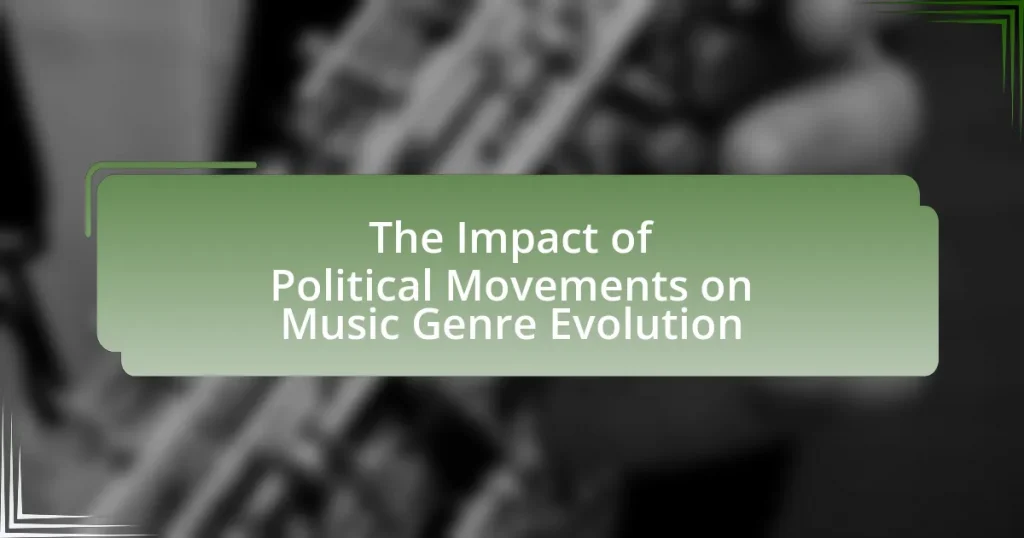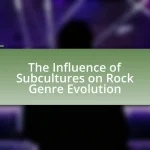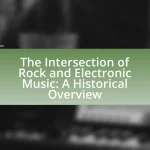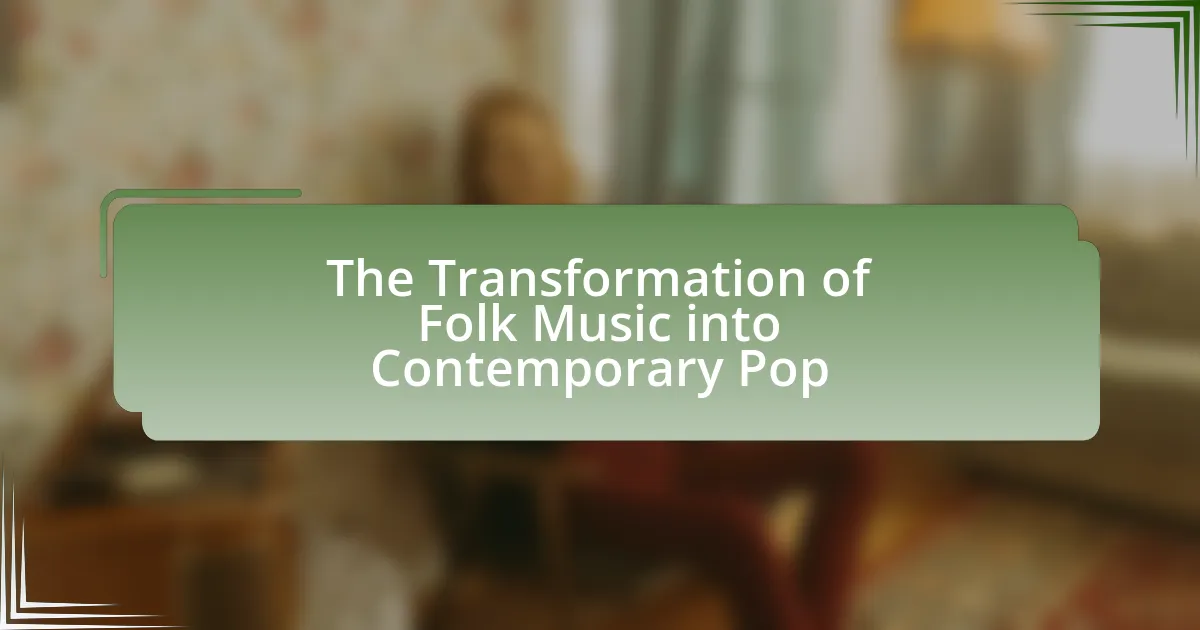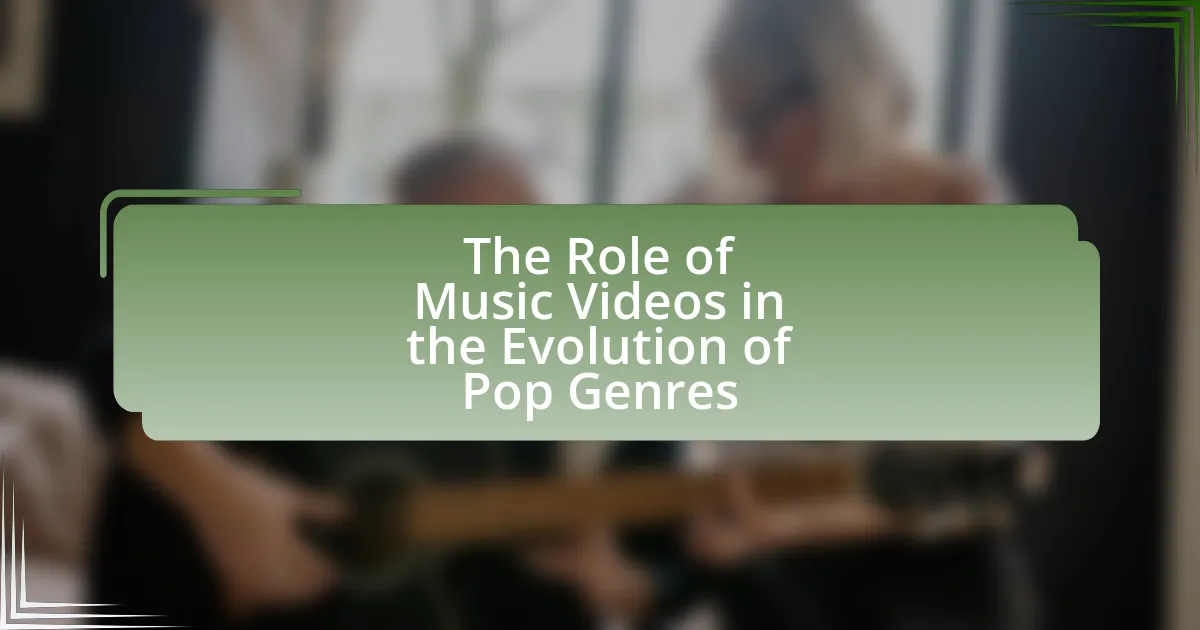The article examines the impact of political movements on the evolution of music genres, highlighting how significant events such as the Civil Rights Movement and the Vietnam War have shaped lyrical content and artistic expression. It discusses the emergence of genres like soul, punk, and hip-hop as responses to political disillusionment and social justice issues, illustrating how artists use music to reflect societal struggles and advocate for change. Additionally, the article explores contemporary implications, emphasizing the role of modern political movements in influencing today’s music landscape and the strategies artists can employ to promote social justice through their work.
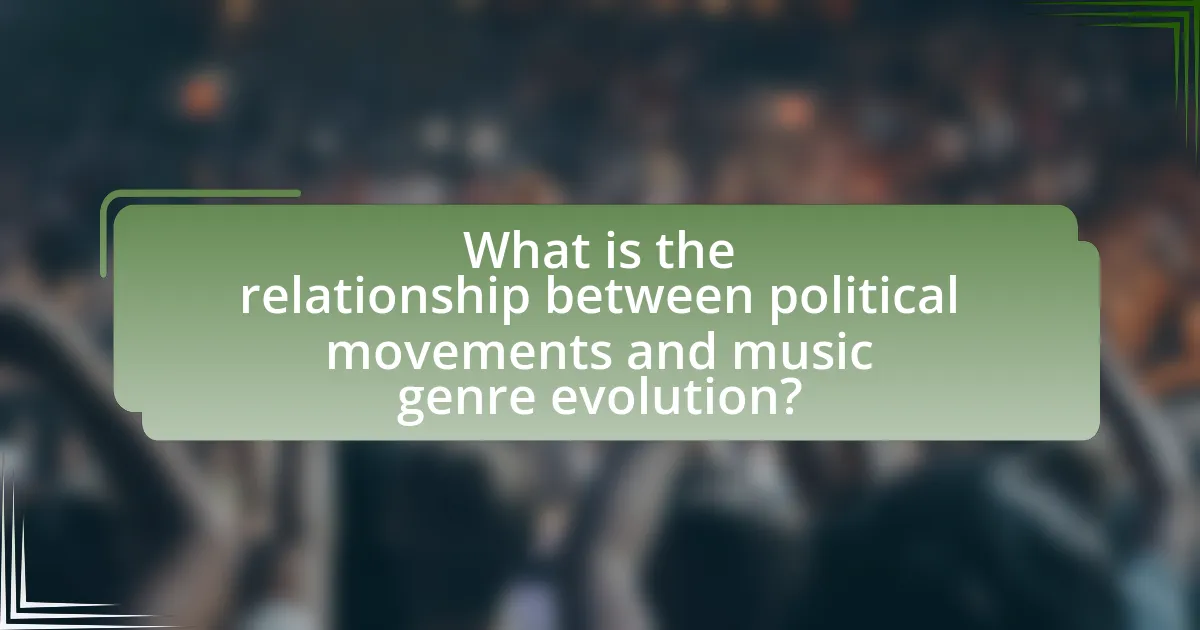
What is the relationship between political movements and music genre evolution?
Political movements significantly influence the evolution of music genres by shaping the themes, styles, and messages conveyed through music. For instance, the civil rights movement in the United States during the 1960s led to the rise of genres like soul and protest music, with artists such as Sam Cooke and Bob Dylan using their platforms to address social injustices. Similarly, punk rock emerged in the 1970s as a response to political disillusionment, with bands like The Clash and Sex Pistols articulating anti-establishment sentiments. These examples illustrate how political contexts can drive musical innovation and genre development, reflecting societal changes and collective sentiments.
How do political movements influence the themes in music genres?
Political movements significantly influence the themes in music genres by shaping the lyrical content, stylistic choices, and overall messages conveyed by artists. For instance, during the civil rights movement in the United States, genres like soul and folk music prominently featured themes of social justice, equality, and resistance, as seen in songs like “A Change Is Gonna Come” by Sam Cooke. Similarly, punk rock emerged as a response to political disillusionment in the 1970s, with bands like The Clash addressing issues such as war and government corruption in their music. These examples illustrate how political contexts drive artists to reflect societal struggles and aspirations, thereby embedding political themes into the fabric of various music genres.
What specific political events have shaped music genres historically?
The civil rights movement in the United States significantly shaped genres like soul and funk, as artists like James Brown and Aretha Franklin used their music to address social justice issues. The Vietnam War influenced the rise of protest music in the 1960s, with folk artists like Bob Dylan and bands like Creedence Clearwater Revival creating songs that criticized the war and government policies. The fall of the Berlin Wall in 1989 led to the emergence of new wave and electronic music in Eastern Europe, as artists began to express newfound freedoms. Additionally, the Arab Spring in the early 2010s inspired genres like hip-hop and pop in the Middle East, with musicians using their platforms to advocate for political change and social reform. These events illustrate how political movements have directly influenced the evolution of music genres by providing a context for artistic expression and social commentary.
How do artists respond to political movements through their music?
Artists respond to political movements through their music by creating songs that reflect social issues, advocate for change, and mobilize listeners. For instance, during the Civil Rights Movement in the 1960s, artists like Sam Cooke with “A Change Is Gonna Come” and Bob Dylan with “The Times They Are a-Changin'” used their music to address racial inequality and inspire activism. These songs not only captured the sentiments of the time but also served as anthems for the movement, illustrating how music can amplify political messages and foster community solidarity.
Why is music considered a form of political expression?
Music is considered a form of political expression because it serves as a powerful medium for conveying social and political messages. Throughout history, artists have used music to protest injustices, mobilize communities, and inspire change, exemplified by songs like “Fight the Power” by Public Enemy, which addresses racial inequality and empowerment. Additionally, during significant political movements, such as the Civil Rights Movement in the United States, music became anthems for change, with artists like Bob Dylan and Nina Simone using their platforms to highlight issues of oppression and resistance. This historical context demonstrates that music not only reflects societal sentiments but also actively participates in shaping political discourse.
What role does music play in social movements?
Music serves as a powerful tool in social movements by fostering unity, expressing collective identity, and amplifying messages of resistance. Historical examples illustrate this role, such as the Civil Rights Movement in the United States, where songs like “We Shall Overcome” became anthems that galvanized participants and communicated shared struggles. Additionally, music can mobilize individuals, as seen in the anti-apartheid movement in South Africa, where artists like Hugh Masekela used their music to raise awareness and inspire action against oppression. These instances demonstrate that music not only reflects the sentiments of social movements but also actively contributes to their momentum and effectiveness.
How does music reflect the sentiments of a political era?
Music reflects the sentiments of a political era by serving as a medium for expression, protest, and social commentary. Throughout history, songs have encapsulated the emotions, struggles, and aspirations of people during significant political movements. For instance, during the Civil Rights Movement in the United States, artists like Sam Cooke with “A Change Is Gonna Come” articulated the longing for equality and justice, resonating deeply with the sentiments of the time. Similarly, protest songs from the Vietnam War era, such as Bob Dylan’s “Blowin’ in the Wind,” voiced the anti-war sentiment and disillusionment prevalent among the youth. These examples illustrate how music not only reflects but also influences public sentiment, acting as both a mirror and a catalyst for change in political contexts.
What are the key music genres affected by political movements?
Key music genres affected by political movements include folk, punk, hip-hop, and reggae. Folk music has historically served as a voice for social change, exemplified by artists like Woody Guthrie during the Great Depression, who used music to address economic inequality. Punk emerged in the 1970s as a reaction against political and social norms, with bands like The Clash and Sex Pistols critiquing government policies and societal issues. Hip-hop, originating in marginalized communities, has been a powerful medium for expressing political dissent, as seen in the works of artists like Public Enemy and Kendrick Lamar, who address systemic racism and inequality. Reggae music, particularly through artists like Bob Marley, has highlighted issues of colonialism and social justice, influencing global awareness of political struggles. Each of these genres reflects the socio-political climate of their times, demonstrating the profound impact of political movements on music evolution.
Which genres have emerged as a response to political change?
Genres that have emerged as a response to political change include punk rock, hip-hop, and protest folk music. Punk rock arose in the 1970s as a reaction against political disillusionment and social unrest, exemplified by bands like The Clash and Sex Pistols, who addressed issues such as government corruption and war. Hip-hop, which gained prominence in the 1980s, often reflects the struggles of marginalized communities and has been used as a platform for social commentary, with artists like Public Enemy and N.W.A. addressing systemic racism and police brutality. Protest folk music, particularly during the 1960s, was characterized by artists like Bob Dylan and Joan Baez, who used their music to advocate for civil rights and anti-war movements. These genres illustrate how music can serve as a powerful vehicle for political expression and social change.
How do different cultures interpret political movements through music?
Different cultures interpret political movements through music by using songs as a medium for expression, resistance, and solidarity. For instance, during the Civil Rights Movement in the United States, artists like Nina Simone and Sam Cooke used music to convey messages of hope and demand for equality, with songs such as “Mississippi Goddam” and “A Change Is Gonna Come” becoming anthems of the struggle. Similarly, in South Africa, the anti-apartheid movement saw musicians like Hugh Masekela and Miriam Makeba utilize music to raise awareness and inspire activism, with songs like “Soweto Blues” highlighting the injustices faced by black South Africans. These examples illustrate how music serves as a powerful tool for cultural interpretation of political movements, reflecting societal values and mobilizing communities.
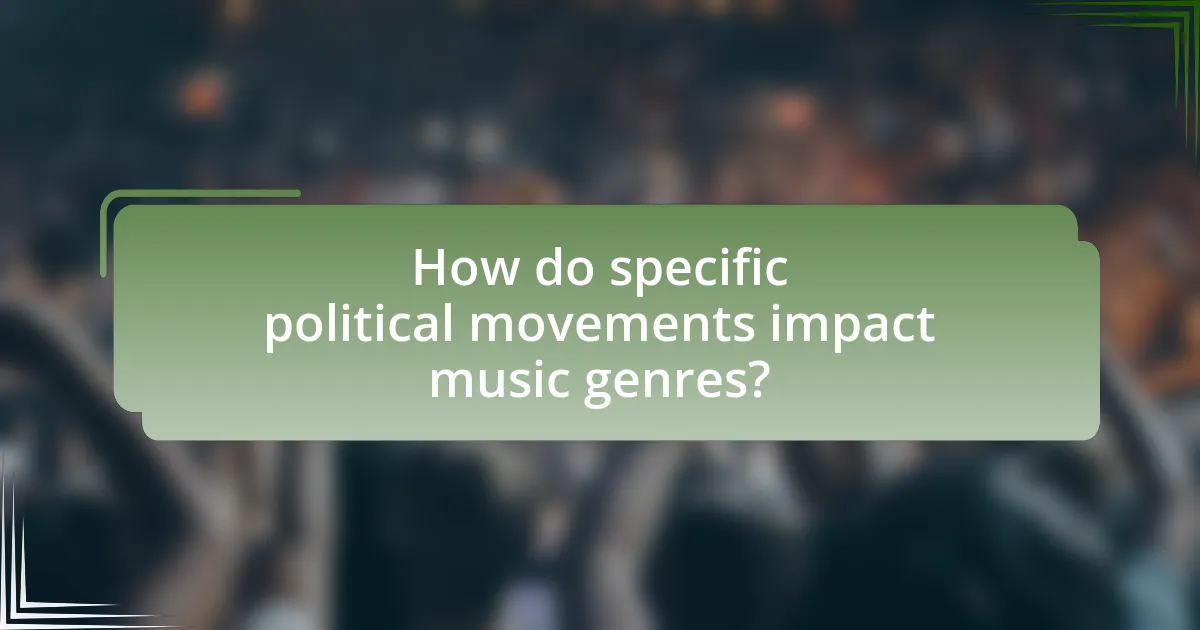
How do specific political movements impact music genres?
Specific political movements significantly influence music genres by shaping lyrical content, themes, and the overall cultural context of the music. For instance, the Civil Rights Movement in the United States led to the emergence of genres like soul and protest music, with artists such as Sam Cooke and Nina Simone using their platforms to address social injustices and advocate for equality. Similarly, the punk rock movement in the 1970s was heavily influenced by anti-establishment sentiments, with bands like The Clash and Sex Pistols expressing dissent against political authority and societal norms. These examples demonstrate that political movements not only inspire the creation of new music genres but also transform existing ones by infusing them with messages that resonate with the struggles and aspirations of the time.
What are the effects of civil rights movements on music evolution?
Civil rights movements significantly influenced music evolution by fostering genres that expressed social justice themes and cultural identity. For instance, the Civil Rights Movement of the 1960s inspired artists like Nina Simone and Sam Cooke to create powerful anthems such as “Mississippi Goddam” and “A Change Is Gonna Come,” which addressed racial inequality and hope for change. Additionally, the incorporation of African American musical traditions into mainstream genres, such as soul and funk, emerged as a direct response to the cultural shifts initiated by these movements. The impact is evident in the way music became a vehicle for activism, with songs serving as rallying cries during protests and demonstrations, thus shaping the evolution of genres like hip-hop, which continues to address social issues today.
How did the Civil Rights Movement influence genres like jazz and soul?
The Civil Rights Movement significantly influenced jazz and soul by infusing these genres with themes of social justice, resistance, and empowerment. Artists like Nina Simone and John Coltrane used their music to address racial inequality and promote civil rights, with songs such as “Mississippi Goddam” and “Alabama” reflecting the struggles faced by African Americans during this period. The movement’s emphasis on identity and pride also led to the emergence of soul music, characterized by its emotional depth and connection to the African American experience, as seen in the works of artists like Aretha Franklin and Marvin Gaye. This integration of political themes into music not only resonated with audiences but also helped to shape the cultural landscape of the 1960s and beyond, making jazz and soul powerful vehicles for social change.
What songs became anthems for civil rights, and why?
Songs that became anthems for civil rights include “We Shall Overcome,” “A Change Is Gonna Come,” and “Fight the Power.” “We Shall Overcome” emerged during the 1960s as a unifying hymn for the Civil Rights Movement, symbolizing hope and resilience against racial injustice. “A Change Is Gonna Come,” written by Sam Cooke in 1964, reflects the struggles faced by African Americans and became an emblem of the fight for equality, inspired by Cooke’s own experiences with racism. “Fight the Power,” released by Public Enemy in 1989, serves as a powerful critique of systemic oppression and has been associated with various social justice movements, emphasizing the need for resistance against inequality. These songs resonate due to their poignant lyrics and historical context, making them integral to the civil rights narrative.
How did anti-war movements shape music in the 20th century?
Anti-war movements significantly shaped music in the 20th century by inspiring artists to create songs that expressed dissent and called for peace. During the Vietnam War, for example, musicians like Bob Dylan and Joan Baez used their platforms to voice opposition to the conflict, leading to the emergence of protest songs as a prominent genre. The song “Blowin’ in the Wind” by Bob Dylan became an anthem for the civil rights and anti-war movements, encapsulating the sentiments of a generation seeking change. Additionally, the Woodstock Festival in 1969 highlighted the connection between music and anti-war activism, showcasing performances that promoted peace and unity. This period saw a surge in genres like folk rock and psychedelic rock, which often incorporated themes of resistance and social justice, reflecting the broader cultural shifts driven by anti-war sentiments.
What genres were most affected by the anti-war sentiment?
The genres most affected by the anti-war sentiment were folk, rock, and punk music. Folk music, particularly in the 1960s, became a vehicle for protest against the Vietnam War, with artists like Bob Dylan and Joan Baez using their songs to convey anti-war messages. Rock music also played a significant role, with bands such as Creedence Clearwater Revival and Jefferson Airplane producing tracks that criticized war and promoted peace. Punk music emerged in the late 1970s as a reaction to political disillusionment, with bands like The Clash and Dead Kennedys addressing anti-war themes in their lyrics. These genres collectively reflected and amplified the societal discontent surrounding war, making them pivotal in the cultural landscape of their times.
How did artists use music to protest against war?
Artists used music as a powerful medium to protest against war by creating songs that conveyed anti-war messages and rallied public sentiment. For instance, during the Vietnam War, artists like Bob Dylan and Joan Baez wrote and performed songs such as “Blowin’ in the Wind” and “We Shall Overcome,” which highlighted the futility and moral implications of war. These songs became anthems for the anti-war movement, mobilizing listeners and fostering a sense of solidarity among those opposed to military conflict. Additionally, the Woodstock Festival in 1969 served as a significant cultural event where music was used to promote peace and protest against the Vietnam War, showcasing performances that emphasized unity and resistance to violence.
What role did punk rock play in political movements?
Punk rock served as a catalyst for political movements by providing a voice for dissent and challenging societal norms. Emerging in the 1970s, punk rock bands like The Clash and Sex Pistols addressed issues such as government corruption, war, and social injustice through their lyrics and public personas. This genre’s raw energy and anti-establishment ethos inspired youth activism, notably during events like the anti-nuclear protests and the fight against apartheid. The direct engagement of punk musicians with political causes, such as the Rock Against Racism campaign in the UK, further solidified punk rock’s role in mobilizing communities and fostering political awareness.
How did punk music reflect the political climate of its time?
Punk music reflected the political climate of its time by serving as a direct response to social unrest, economic hardship, and disillusionment with authority during the 1970s and 1980s. The genre emerged in the context of rising unemployment, political corruption, and the Vietnam War, with bands like The Sex Pistols and The Clash articulating anti-establishment sentiments through their lyrics and aggressive sound. For instance, The Sex Pistols’ song “God Save the Queen” criticized the British monarchy and expressed widespread frustration with the government, resonating with a youth culture that felt marginalized and voiceless. This alignment with political discontent made punk not just a musical movement but a form of protest, encapsulating the anger and aspirations of a generation seeking change.
What are some notable punk songs that address political issues?
Notable punk songs that address political issues include “Anarchy in the U.K.” by the Sex Pistols, which critiques the British government and societal norms, and “Killing in the Name” by Rage Against the Machine, which confronts racism and police brutality. “Holiday in the Sun,” also by the Sex Pistols, reflects on the impact of war and political unrest. Additionally, “American Idiot” by Green Day critiques American politics and media culture. These songs exemplify how punk music serves as a platform for political expression, often reflecting the socio-political climate of their times.
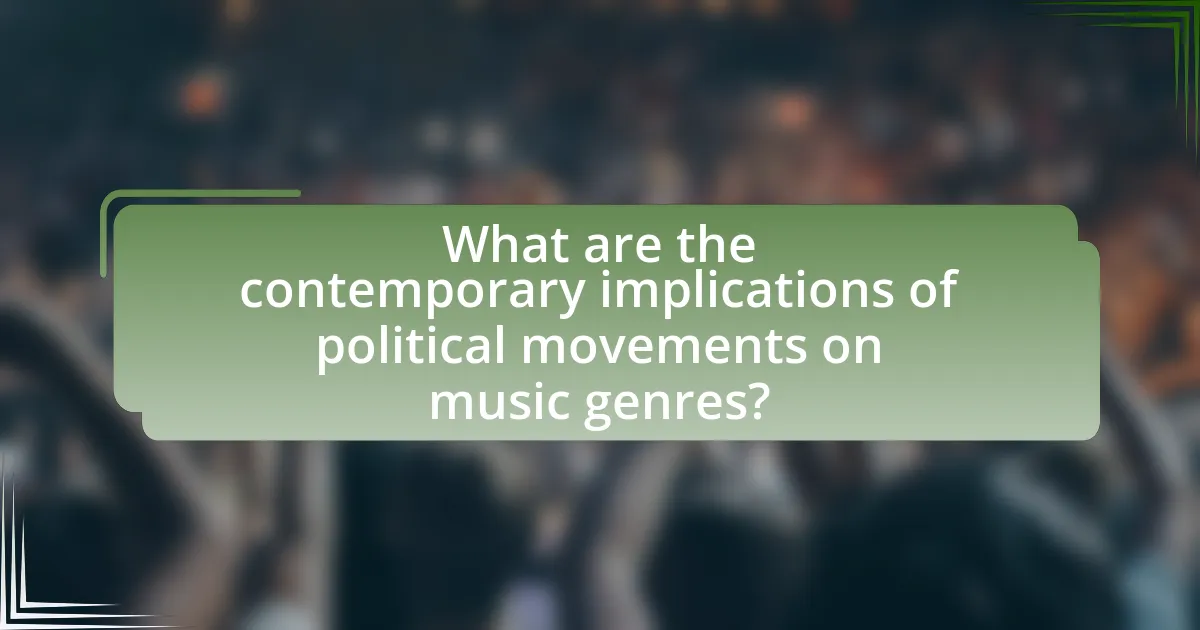
What are the contemporary implications of political movements on music genres?
Contemporary political movements significantly influence music genres by shaping lyrical content, artist activism, and genre evolution. For instance, the Black Lives Matter movement has led to a resurgence of protest music within hip-hop and R&B, with artists like Kendrick Lamar and Janelle Monáe addressing systemic racism and social justice in their work. Additionally, the LGBTQ+ rights movement has fostered the rise of genres like queer pop, where artists such as Lil Nas X and Troye Sivan openly express their identities and advocate for acceptance. These movements not only inspire new musical styles but also encourage collaborations across genres, reflecting a broader cultural dialogue. The impact is evident in the increased visibility of politically charged themes in mainstream music, demonstrating how contemporary political movements continue to shape the landscape of music genres today.
How do modern political movements influence today’s music landscape?
Modern political movements significantly influence today’s music landscape by shaping lyrical content, artist activism, and genre evolution. For instance, movements such as Black Lives Matter have inspired artists to create music that addresses social justice, police brutality, and racial inequality, leading to a surge in protest songs across genres like hip-hop and pop. The 2020 protests resulted in a notable increase in streaming of songs that resonate with these themes, exemplified by tracks like “I Can’t Breathe” by H.E.R. and “The Bigger Picture” by Lil Baby, which directly respond to contemporary political issues. Furthermore, the rise of digital platforms allows for rapid dissemination of politically charged music, enabling artists to reach wider audiences and mobilize support for their causes. This interplay between political activism and music not only reflects societal sentiments but also drives cultural conversations, illustrating the profound impact of modern political movements on the music landscape.
What genres are currently being shaped by political activism?
Genres currently being shaped by political activism include hip-hop, punk rock, and folk music. Hip-hop has become a powerful medium for addressing social justice issues, with artists like Kendrick Lamar and J. Cole using their platforms to discuss systemic racism and inequality. Punk rock has historically been associated with anti-establishment sentiments, with bands like Rise Against and Anti-Flag addressing political corruption and war. Folk music, particularly through artists like Joan Baez and more recently, Hozier, often reflects themes of activism and social change, emphasizing grassroots movements and human rights. These genres illustrate how political activism influences lyrical content and artistic expression, making them vital channels for social commentary.
How do social media and technology affect the relationship between politics and music?
Social media and technology significantly enhance the relationship between politics and music by facilitating rapid dissemination of political messages through musical content. Platforms like Twitter and Instagram allow artists to share their political views and music instantly, reaching a global audience and mobilizing support for various causes. For instance, during the Black Lives Matter movement, artists such as Beyoncé and Kendrick Lamar used their music and social media presence to address systemic racism, influencing public discourse and political action. This interconnectedness amplifies the impact of music as a tool for political expression, enabling real-time engagement and fostering community among listeners who share similar political beliefs.
What lessons can be learned from the historical impact of political movements on music?
Political movements have historically shaped music by serving as catalysts for social change and artistic expression. For instance, the Civil Rights Movement in the United States significantly influenced genres like soul and jazz, with artists such as Nina Simone and Sam Cooke using their music to address racial injustice and promote equality. This demonstrates that music can amplify political messages and foster community solidarity. Additionally, the anti-war movement during the Vietnam War era led to the rise of protest songs, exemplified by Bob Dylan’s “Blowin’ in the Wind,” which became anthems for peace and resistance. Such examples illustrate that music not only reflects societal issues but also plays a crucial role in mobilizing public sentiment and inspiring action.
How can artists today draw inspiration from past political movements?
Artists today can draw inspiration from past political movements by analyzing the themes, messages, and artistic expressions that emerged during those times. For instance, the civil rights movement in the 1960s inspired musicians like Bob Dylan and Nina Simone to create powerful songs that addressed social justice and equality. These historical examples demonstrate how artists can use similar themes of resistance, empowerment, and activism in their own work, reflecting contemporary issues such as racial inequality and climate change. By studying the impact of movements like feminism, anti-war protests, and LGBTQ+ rights, artists can incorporate relevant historical narratives into their music, fostering a connection between past struggles and present challenges.
What strategies can musicians use to engage with political issues through their work?
Musicians can engage with political issues through their work by incorporating socially relevant themes into their lyrics, using their platforms for activism, and collaborating with organizations that promote social change. By writing songs that address specific political events or injustices, such as systemic racism or climate change, musicians can raise awareness and inspire action among their listeners. For instance, artists like Bob Dylan and Public Enemy have historically used their music to comment on civil rights and social justice, effectively influencing public discourse. Additionally, musicians can leverage social media to amplify their messages, mobilize fans for protests, or fundraise for causes, as seen with campaigns like “Artists for Peace and Justice.” These strategies not only enhance the political relevance of their work but also contribute to the evolution of music genres that reflect societal changes and movements.
How can music serve as a tool for political change in the future?
Music can serve as a tool for political change in the future by amplifying social movements, fostering community solidarity, and influencing public opinion. Historically, music has played a pivotal role in political activism, as seen in the civil rights movement with songs like “We Shall Overcome,” which united individuals and inspired action. In the future, advancements in technology and social media will enable artists to reach wider audiences, making it easier to mobilize support for various causes. For instance, platforms like TikTok have already shown how music can quickly spread messages and rally support for movements such as Black Lives Matter. Additionally, music can provide a voice for marginalized communities, allowing them to express their struggles and aspirations, thereby driving political discourse and change.
What are effective ways for artists to promote social justice through music?
Artists can effectively promote social justice through music by creating songs that address social issues, collaborating with activists, and using their platforms to raise awareness. For instance, artists like Kendrick Lamar and Billie Eilish have released tracks that tackle systemic racism and climate change, respectively, which resonate with listeners and spark conversations. Collaborations with social justice organizations, such as the partnership between musicians and the Black Lives Matter movement, amplify messages and mobilize audiences. Additionally, hosting benefit concerts or participating in community events can directly support social causes, as seen in events like Live Aid, which raised funds for famine relief. These methods not only engage fans but also contribute to broader societal change.
How can listeners support politically charged music movements?
Listeners can support politically charged music movements by actively engaging with the music, sharing it on social media, attending live performances, and purchasing merchandise. Engaging with the music amplifies its reach, while sharing it on platforms like Twitter and Instagram can raise awareness about the issues addressed in the songs. Attending live performances not only supports the artists financially but also fosters a community of like-minded individuals who are passionate about the cause. Purchasing merchandise directly contributes to the artists’ ability to continue their work and spread their message. According to a study by the Pew Research Center, 72% of music fans believe that music can influence social change, highlighting the significant role listeners play in promoting politically charged movements.
